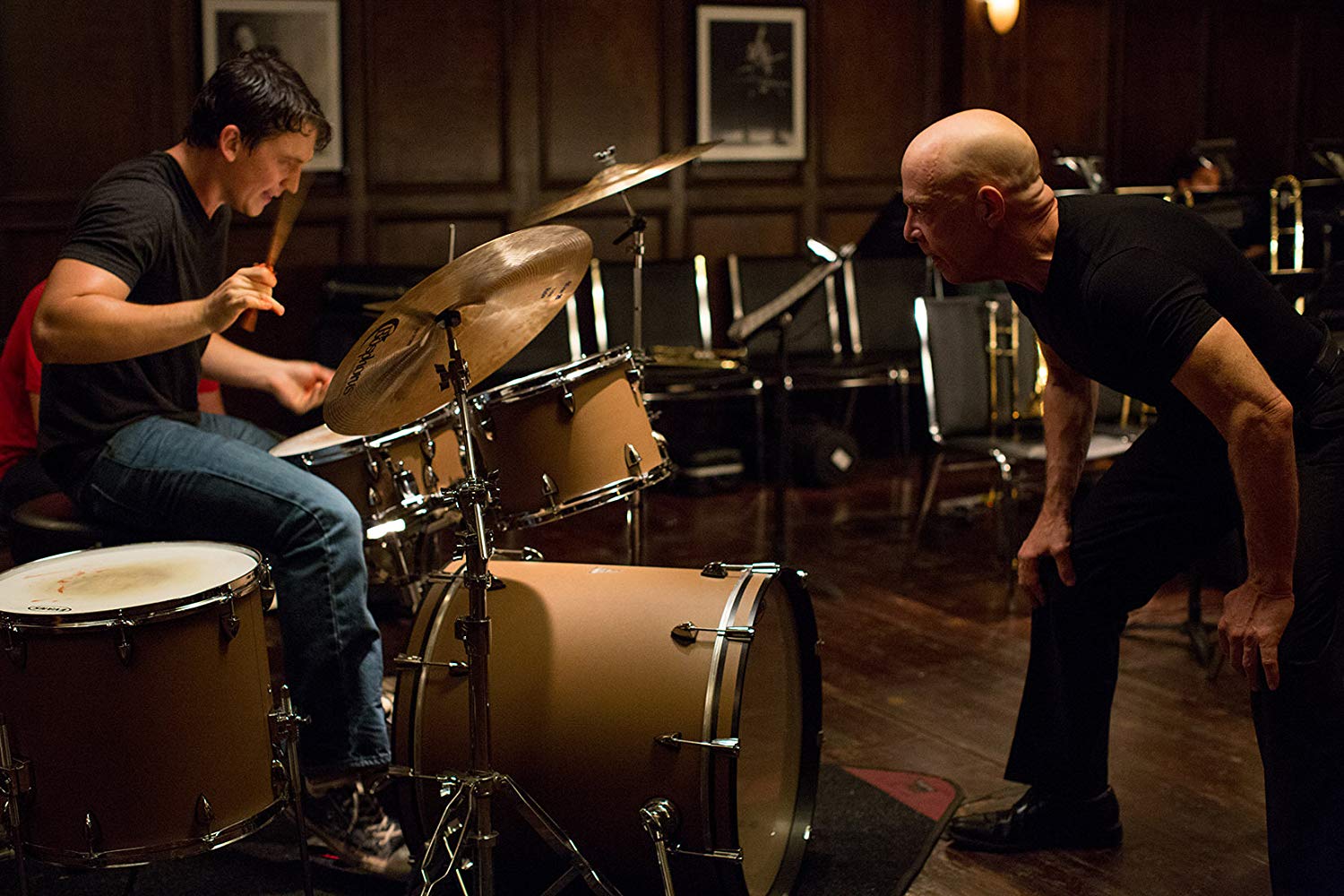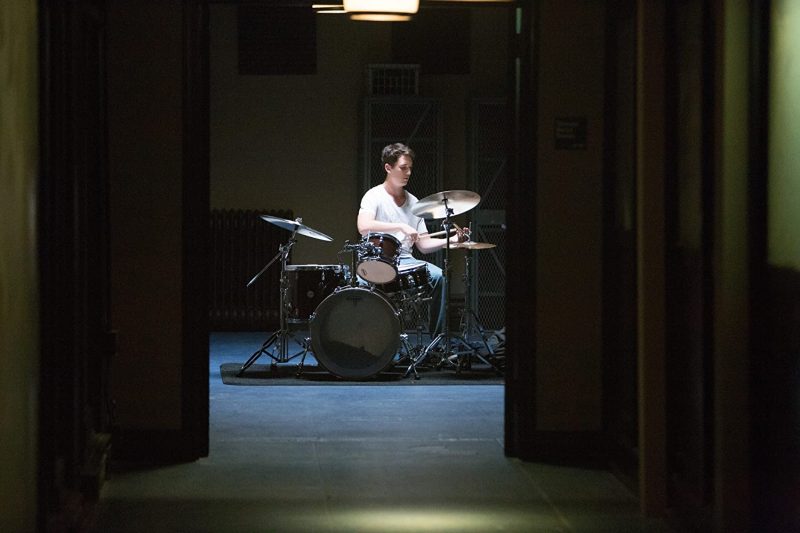Allow me to commence this piece by emulating the style of film reviews found in The Times, you know, those riddled with stars and adjectives:
“Spine-chilling!”
“Exceptional!”
“Prepare for two hours of tension.”
For years, I would attempt to imbue meaning into such prose by film critics or prominent figures in the world of cinema; I’ve now succeeded. “Whiplash” undeniably warrants every ounce of this ‘praise.’ It might be the finest film I’ve seen in recent memory, even though it doesn’t belong to the thriller genre, it remains a masterpiece that leaves one on edge, disconcerted, and infuriated. Particularly if you have an affinity for music, especially jazz, failing to watch it would be an egregious oversight. It’s an absolute collector’s item, a classic in the making.
As I write these lines, film competitions continue to pile accolades onto J.K. Simmons for his role in “Whiplash.” Whenever the film enters a competition, it never leaves without at least one award, and, especially, the Best Supporting Actor accolade. J.K. Simmons portrays a deranged character whom you’ll feel compelled to punch if he were in front of you, yet you’ll also admire every action he takes. Watching him will send shivers down your spine. As you watch the film, every drop of blood shed on-screen will feel like it’s flowing from your own veins, and your tension will skyrocket. This is because the film doesn’t just push Andrew’s limits; it pushes your limits as well.

Let’s briefly touch upon the plot of this masterpiece. Andrew gains admission to the country’s most prestigious art school, driven by his dream of becoming a drummer. One of the school’s standout features is having a figure like “Terence Fletcher.” A perfectionist with a touch of madness, Terence takes Andrew under his wing and begins pushing his limits to the extreme. He won’t just find Andrew’s limits; he’ll attempt to shatter the ceiling.
The film revolves around Andrew’s struggle to join Terence’s band and prove himself as the top drummer. However, as the film progresses, it transcends its musical dimension, delving into Andrew’s responses to the battle for perfection and his personal transformation. In a way, we’re witnessing a musical equivalent of Rocky. Andrew, initially an ordinary student at the school, spirals into madness under Terence’s abuse and will even shed blood to prove himself. Isn’t it fascinating? We’re discussing a music film, yet we’re talking about blood. Blood, sweat, accidents, fights, nervous breakdowns, noise, chaos, rebellion, and much more make this film more than a simple narrative; it’s a relentless assault on the audience’s nerves.
The film unfolds as a thunderous tennis rally of shouts and echoes between Andrew and Terrence. As Terrence continues to torment Andrew, the latter doesn’t take a step back; instead, he forges forward, igniting a new battle. Terrence discerns the hidden egotistical facet within Andrew, coaxing him out of his shell by crushing his emotions. However, in doing so, he employs methods that might push even us, the audience, to the brink. Consequently, we are not witnessing a gradual transformation in the film, but rather, we are observing a central character driven suddenly insane by Terrence’s harassment, demanding more. This prevents the film from ever slowing down; it hurtles downhill for a relentless 106 minutes.
Terrence, on the other hand, is an outright psychopath. Amid hundreds of instruments, he possesses an ear that can detect a single wrong note. He is exceedingly perfectionistic and self-centered. What he says goes, a band will be formed in pursuit of his ‘interests,’ and success will be owned by him because he is exceptional. Andrew, however, represents the first significant obstacle Terrence has encountered in a long time. He is both ready to comply with Terrence’s demands and eager to defy him to make his own demands heard. This clash between the two is brilliantly portrayed by J.K. Simmons and Miles Teller, leaving an indelible mark on the world of acting for years to come.

In terms of its musical aspect, the film is excessively gratifying. While it occasionally features ear-pounding scenes, it generally progresses with a celebratory air. Notably, the film, despite being a musical, never allows for a single moment of detachment due to its unceasing action sequences. J.K. Simmons, on the red carpet of the Golden Globe Awards, mentioned that the film was shot in just 19 days. 19 days! This is a remarkable feat for a 29-year-old director.
Damien Chazelle, despite his youth, may have already directed the most significant film of his career. Both in terms of narrative and visuals, the film is flawless. The director’s choices in direction and editing further intensify the duel between the characters. The story predominantly unfolds in the fierce gaze of two characters who are locked in mutual animosity. While there is a subplot involving a relationship in the film, it remains relatively inconspicuous. The forefront is dominated solely by the clash between Andrew and Terrence. The film accelerates rapidly from the outset, continues with exasperating momentum, and concludes with a final sequence that will be etched in memory for years to come.
In essence, go and watch Whiplash. Witness this chaotic masterpiece where ambitions collide, egos do battle, and music is wielded like a weapon. Cinema is teeming with brilliantly portrayed eccentric characters, and Whiplash has introduced us to Terrence Fletcher, who, much like the film’s characters, shatters the fourth wall and drives the audience to the brink. Damien Chazelle has added an unforgettable masterpiece to our lives with his signature work, Whiplash.

Cast & Crew
director: Damien Chazelle
writers: Damien Chazelle
starring: Miles Teller, J.K. Simmons
USA | 2014 | 107 MINUTES |
